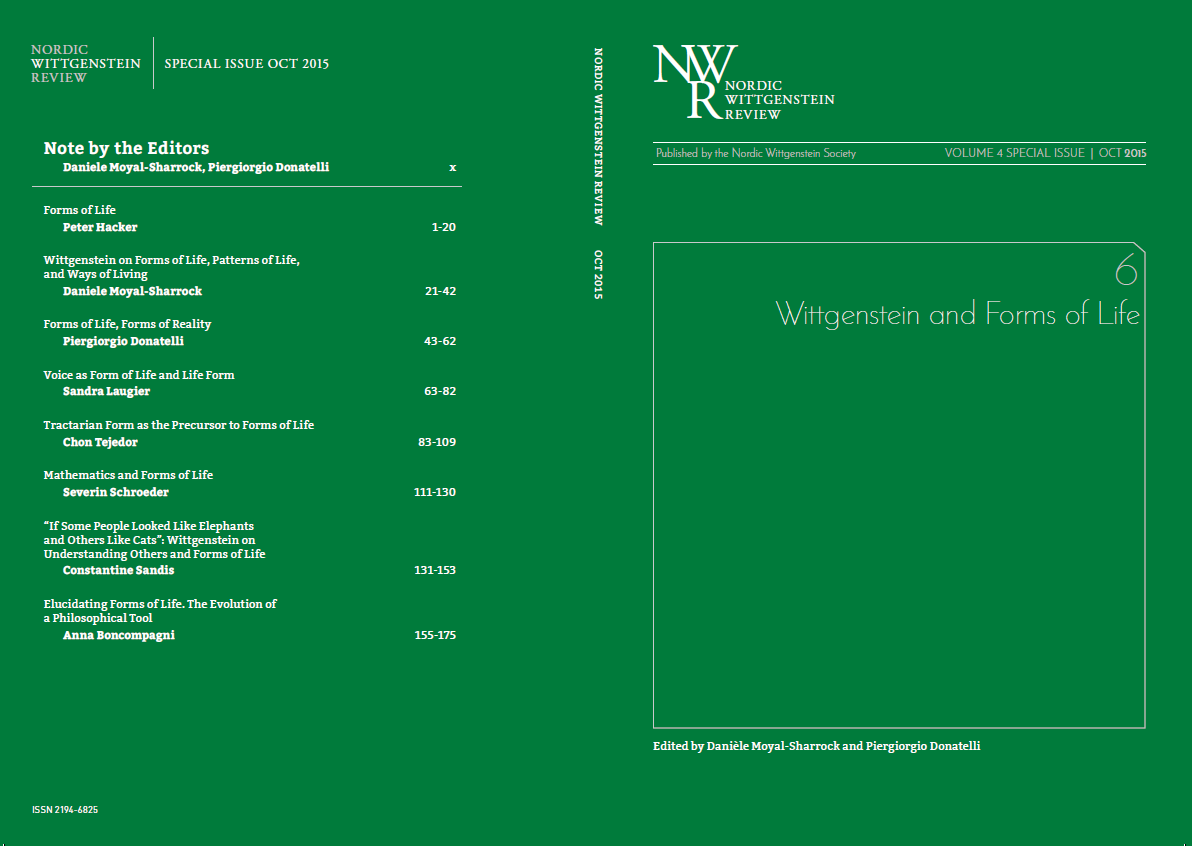“If Some People Looked Like Elephants and Others Like Cats”: Wittgenstein on Understanding Others and Forms of Life
DOI:
https://doi.org/10.15845/nwr.v4i0.3372Keywords:
Wittgenstein Ludwig, Sraffa Paul, understanding, form of life, explanation, meaning, culture, behaviour, lifeAbstract
This essay introduces a tension between the public Wittgenstein’s optimism about knowledge of other minds and the private Wittgenstein’s pessimism about understanding others. There are three related reasons which render the tension unproblematic. First, the barriers he sought to destroy were metaphysical ones, whereas those he struggled to overcome were psychological. Second, Wittgenstein’s official view is chiefly about knowledge while the unofficial one is about understanding. Last, Wittgenstein’s official remarks on understanding themselves fall into two distinct categories that don’t match the focus of his unofficial ones. One is comprised of those remarks in the Investigations that challenge the thought that understanding is an inner mental process. The other consists primarily of those passages in PPF and On Certainty concerned with the difficulty of understanding others without immersing oneself into their form of life. In its unofficial counterpart, Wittgenstein focuses on individuals, rather than collectives. The official and the unofficial sets of remarks are united in assuming a distinction between understanding a person and understanding the meaning of their words. If to understand a language is to understand a form of life, then to understand a person is to understand a whole life.
References
Anscombe, G.E.M. 1957. Intention. Oxford: Basil Blackwell.
Austen, J. 1813. Pride and Prejudice. London: T. Egerton.
Baker, G.P. & Hacker, P.M.S. 2009. Wittgenstein: Rules, Grammar and Necessity: Vol. 2 of an Analytical Commentary of the Philosophical Investigations, Essays and Exegesis of §§ 185-242, 2nd edition (1st 1985). Extensively revised by P.M.S. Hacker. Oxford: Wiley-Blackwell.
Beardsmore, R.W. 1996. “If a lion could talk...” In K.S. Johannessen & T. Nordenstam, eds. 1996. Wittgenstein and the Philosophy of Culture. Vienna: Hölder-Pickler-Tempsky, pp. 41-59.
Bennett, A. 2012. Cocktail Sticks, in Hymn and Cocktail Sticks: Two Recollections. London: Faber & Faber, pp. 77-120.
Berlin, I. 1974. “The Divorce between the Sciences and the Humanities”. Tykociner lecture published by the University of Illinois. Reprinted in Berlin (1998: 326-58), to which any page numbers refer.
Berlin, I. 1998. The Proper Study of Mankind. Edited by H. Hardy & R. Hauscheer. London: Pimlico.
Collingwood, R.G. 1946. The Idea of History. Revised edition, 1994. Oxford: Clarendon Press.
Engelmann, P. 1967. Letters from Ludwig Wittgenstein, with a Memoir, ed. B. McGuiness, trns. L. Furtmüller. Oxford: Blackwell.
Glock, H-J. 1996. A Wittgenstein Dictionary. Oxford: Blackwell.
Hacker, P.M.S. 2015. “Forms of Life”. Nordic Wittgenstein Review 4, Special Issue on Forms of Life 2015.
Hertzberg, L. 2005. “The Limits of Understanding”, Sats – Nordic Journal of Philosophy 6, pp. 5-14.
Klagge, J. C. 2011. Wittgenstein in Exile. Cambridge, MA: The MIT Press.
Lear, J. 2006. Radical Hope: Ethics in the Face of Cultural Devastation. Boston, MA: Harvard University Press.
MacIntyre, A. 1972. “Hegel on Faces and Skulls”. Reprinted in his The Tasks of Philosophy. Cambridge: Cambridge University Press, pp. 74–85.
Malcolm, N. 1986. Nothing is Hidden: Wittgenstein's Criticism of his Early Thought. Oxford: Basil Blackwell.
McGuinness, B. 2012. (ed.) Wittgenstein in Cambridge: Letters and Documents 1911-1951. Oxford: Wiley-Blackwell.
Monk, R. 1991. Wittgenstein: The Duty of a Genius. London: Vintage.
Moyal-Sharrock, D. 2007. Understanding Wittgenstein’s On Certainty. Basingstoke: Palgrave Macmillan.
Rhees, R. 2006. Wittgenstein and the Philosophy of Discourse. Second edition, ed. D.Z. Phillips. Oxford: Blackwell.
Sandis, C. 2012. “Understanding the Lion For Real”. In: A. Marques & N. Venturinha, eds. 2012. Knowledge, Language and Mind: Wittgenstein's Thought in Progress. Berlin: de Gruyter, pp.138-61.
Sandis, C. forthcoming. “Grasping Others Through Art and Art Through Others: Wittgenstein on Understanding”. In: G. Hagberg, ed. forthcoming. Wittgenstein on Aesthetic Experience. London: Palgrave.
Saul, J.M. 2012. Lying, Misleading, and What is Said: An Exploration in the Philosophy of Language and Ethics. Oxford: Oxford University Press.
Spranger, E. 1914/1928. Lebensformen. Halle: Niemeyer [Types of Men, trns. P. J. W. Pigors. New York: G. E. Stechert Company].
Tanney, J. 2009. “Gilbert Ryle”. The Stanford Encyclopedia of Philosophy (Winter 2009 Edition), ed. Edward N. Zalta: <http://plato.stanford.edu/archives/win2009/entries/ryle > Accessed Sept. 28, 2015.
Al-Tawhidi, A.H. & Miskawayh, A.A.. 1951. al-Hawamil wa'l-shawamil [The Scattered and the Gathered]. Eds. A. Amin & S.A. Saqr (Cairo: Lajnat al-Ta'lif wa'l-Tarjama wa-al-Nashr). English translation in preparation by S. Vasalou for the Library of Arabic Literature.
Tilghman, B.R. 1983. “Understanding People and Understanding Art”. In: Akten des 8. Internationalen Wittgenstein Symposiums : 15. bis 21 (Aug). l Kirchberg am Wechsel. Vienna: Hölder-Pichler-Tempsky, pp. 153-92.
Vico, G. 1725[1744]/1999. New Science: Principles of the New Science Concerning the Common Nature of Nations , trns. D. Marsh , 3rd rev. ed. London: Penguin.
von Savigny, E. 1991. “Common behaviour of many a kind: Philosophical Investigations section 206”. In: R. Arrington & H-J. Glock, eds. 1991. Wittgenstein’s Philosophical Investigations. London: Routledge, pp. 105-119.
Winch, P. 1964. “Understanding a Primitive Society”. First published in American Philosophical Quarterly, Vol. I. Reprinted in Winch (1972:8-49), to which any page numbers refer.
Winch, P. 1972. Ethics and Action. London: Routledge & Kegan Paul.
Winch, P. 1987. Trying to Make Sense. Oxford: Basil Blackwell.
Wittgenstein, L. 1921/1961. Tractatus Logico-Philosophicus [TLP], revised trns. D.F. Pears & B.F. McGuiness. London: Routledge.
Wittgenstein, L. 1959. On Certainty [OC], trns. G.E.M. Anscombe. Oxford: Blackwell.
Wittgenstein, L. 1982. Last Writings on the Philosophy of Psychology vol. 1 ([LW] eds. G.H. von Wright & H.Nyman, tr. trns. C.G.Luckhard & M.E.Aue. Oxford: Blackwell.
Wittgenstein, L. 1998. Culture and Value [CV], rev. 2nd edn. (A. Pichler), ed. G. H. von Wright, trans. P. Winch. Oxford: Blackwell.
Wittgenstein, L. 2009. Philosophical Investigations(PI),trnsl. G.E.M. Anscombe. Revised 4th edition by P.M.S. Hacker & J. Schulte, including Philosophy of Psychology - A Fragment [PPF]. Oxford: Wiley Blackwell.
Wittgenstein, L., 2000. Wittgenstein’s Nachlass. The Bergen Electronic Edition. Oxford: Oxford University Press [BEE]
Downloads
Published
Issue
Section
License
NWR uses the Creative Commons license CC-BY.
Vol. 1-3 used CC-BY-NC-SA. The collected works copyright ownership for Vol. 1-2 were shared by Nordic Wittgenstein Society and ontos Verlag/De Gruyter.









